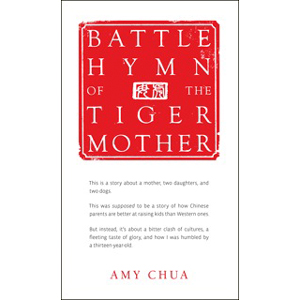
The Battle Hymn of the Tiger Mother by Amy Chua
 “Chinese parents believe that their kids owe them everything.” Therefore, when her daughters gave her homemade birthday cards she deemed unacceptable, Chua gave them back. “I want a better one – one that you’ve put some thought and effort into. I have a special box, where I keep all my cards from you and Sophia, and this one can’t go there.”
“Chinese parents believe that their kids owe them everything.” Therefore, when her daughters gave her homemade birthday cards she deemed unacceptable, Chua gave them back. “I want a better one – one that you’ve put some thought and effort into. I have a special box, where I keep all my cards from you and Sophia, and this one can’t go there.”
On one hand, I’m shocked and appalled Chua would say that to her child. On the other hand, I’ve gotten these cards and pictures, made in haste at the last minute. Rather than tell my daughters that they are not worthy of my keepsake box, I simply toss them in the garbage days later when they’re asleep. Am I any better?
When her mother-in-law laughed in astonishment at this story and admitted maybe she would have tried the same tactic with her children had she not feared having to ask would make the gift lack meaning, Chua argues, “I think it’s too idealistic to expect children to do the right things on their own…Also, if you force them to do what you want, you don’t have to be mad at them.” But as her mother-in-law reminded her, they would be mad at her.
By the time the reader is a third of the way through The Battle Hymn of the Tiger Mother, the anger that Chua’s oldest daughter has built up is obvious. The fact that Lulu hadn’t been accepted at a prestigious music school and “the Chinese parenting approach is weakest when it comes to failure” just compounded the tension at home. When Chua won’t take Lulu to the hairdresser because she hasn’t behaved in the way Chua feels the daughter should, Lulu simply takes a pair of scissors to her own hair.
Chua admits that the question she most often gets is “Who are you going all this pushing for – your daughters…or yourself?” While she says her answer is “unequivocally 100% for my daughters” I am not yet convinced. Chua believes my doubts are indicative of my Western thinking, as in Chinese parenting “the child is the extension of the self.”
The first comment I ever got on my blog Befriending Forty was from a woman whose husband had told her an “awesome” Chinese statement. “There are three stages to life. The first – to live for your parents. The second – to live for yourself. The third – to live for your children.” Knowing that my post had essentially pointed out that while I had experienced a lot during my youth I hadn’t felt I’d done much lately, my friend asked, “Did that comment make you feel like slitting your wrists or what?”
I understand what Chua is saying, “Winning prizes gives you opportunities, and that’s freedom,” but if the prizes come with the costs – both financial and emotional – that Chua describes in her book then I’m more than fine with my non-prizing winning children. Chua’s way of parenting might be much harder, as she claims for “there is simply no respite.” How can there be when you spend your Sunday driving two hours to New York City so your child can have a one hour lesson with some renowned violin teacher and then drive home so you can practice piano with your older daughter?
I keep thinking about this scene in Something to Talk About when the grandmother (Gena Rowlands) says to her daughter (Julia Roberts), “You did that” when the granddaughter won a horse competition. Roberts’ character corrects Rowlands’ character by saying, “No, she did that.” My kids may never play at Carnegie Hall, but their accomplishments will always be their own – just as mine belong to me, not my mother.
Don’t forget to like Parenting by the Book on Facebook for updates on blog posts.
Follow Befriending Forty at http://befriendingforty.blogspot.com and find out what happens when the person I thought I’d be meets the person I actually became.






